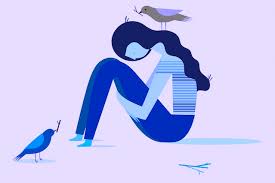Depression and Loss
Posted on June 10th, 2016
Depression and Loss
What is depression?
Depression and sadness are all about loss. Any interpretation by the brain of loss equals sadness. This could be the loss of someone we love, or loss of freedom, independence, control, a job, a relationship or even a dream of something better. If you are experiencing sadness there is no doubt you are experiencing loss.
Depression is the low sad mood that we get in. However, you can have depressive symptoms without actually having major depressive disorder. It’s normal for all of us to have some depressive symptoms at times. It’s normal to be sad when sad things are happening in our lives. However, if that low flat sad mood continues on for more than a couple of weeks and becomes quite intense, and impacts on our ability to function (get up, go to work, shower, do our normal routine) then this might be a good indicator that our symptoms are getting more serious and we need to talk to a professional (GP or psychologist…or both) for support.
Symptoms of Depression
Mood
- Low flat sad mood
- Loss of pleasure and enjoyment in activities that we would normally enjoy.
- Forgetfulness and difficulty concentrating
- Anxiety. Although anxiety and depression are two separate conditions, they are like best friends; they like to hang out together. Often if we are anxious, we get down about being anxious, or if we are down we get anxious about being down.
- A sense of worthlessness
- Loss of hope
Thinking changes
The two unhelpful thinking styles that relate to depression are
- Mental filtering or discounting the positives, this is where we ignore any positive feedback and latch on to anything negative. For example, a friend my say “hey you look great in that shirt, but you are looking a bit tired”. We then think “Oh no they think I look awful”. We completely ignore the positive aspect of their message and focus on the only negative part.
- Personalisation. This is where we make everything about me. ME, ME, ME! This is where we take responsibility for everything that does go wrong or could go wrong even when we might only be partly responsible or not even responsible at all. For example, you might get to work and your boss snaps at you. Then you think “what have I done now to upset her”, when it might have nothing to do with you. Someone might have just cut her off in traffic or she might have problems at home. There are numerous reasons why she might be upset and none of them might have anything to do with you.
Physical
- Sleep disturbance. Either I want to sleep all the time, or can’t sleep at all, or can get to sleep but keep waking up.
- Appetite change. If I am a comfort eater (and yes I am J) I eat everything that comes within arms reach or I don’t want to eat at all.
- Loss of libido – loss of interest in sex
- Loss of motivation – everything becomes a burden.
- Tiredness and lethargy
Behaviour Change
The number one behaviour change when we get in a low mood is social withdrawal or isolation. For example, we might go into the lunchroom at work, but we will pull out our phone and make it clear to everyone we don’t want to talk. Or we might get an invitation to go out for dinner on the weekend, but make up some excuse not to go.
What maintains a low mood?
The interesting thing about depression is that it doesn’t really matter what causes depression (I know this sounds weird, but it becomes irrelevant) we are actually doing three things to maintain a low mood without realising we are doing it (it’s not like we are deliberately trying to be depressed). The three things we do to keep ourselves down are:
- Inactivity physically
- Inactivity mentally
- Social withdrawal
If we do nothing else but start increasing our physical, mental and social activities our mood will start to lift.
What causes Depression?
The answer to this question is many things contribute to depression.
- There is definitely a genetic component to depression. What this means is that if mum, dad and aunt Betty all have depression that will increase your vulnerability, it does not mean you will be depressed, you will still need your own triggers.
- Hormones
- And the biggest contributor is….. our thinking style. So even if we do have a genetic predisposition, we can still improve our mood and lift our depression if we change how we are thinking.
Treatment Options
The leading treatments for depression include anti-depressant medication, however this does not necessarily fix what is causing the low mood. Whereas therapy actually addresses what is causing and triggering your low mood. The leading form of therapy in Australia for depression is Cognitive Behavioural Therapy (CBT). Please see previous blogs for an overview of CBT.
If you are experiencing a persistent or recurring low mood and sadness maybe it’s time to talk to a psychologist for support. As psychologists, our focus is on therapy. Therapy is more than just talking or giving advice, it’s actively learning new skills.
Written by Judy Travis

